In this article:
There are a lot of reasons that you may need to pop your ears. Something as simple as getting to your apartment in a lift can put pressure on your ears that need to be relieved by popping your ears.
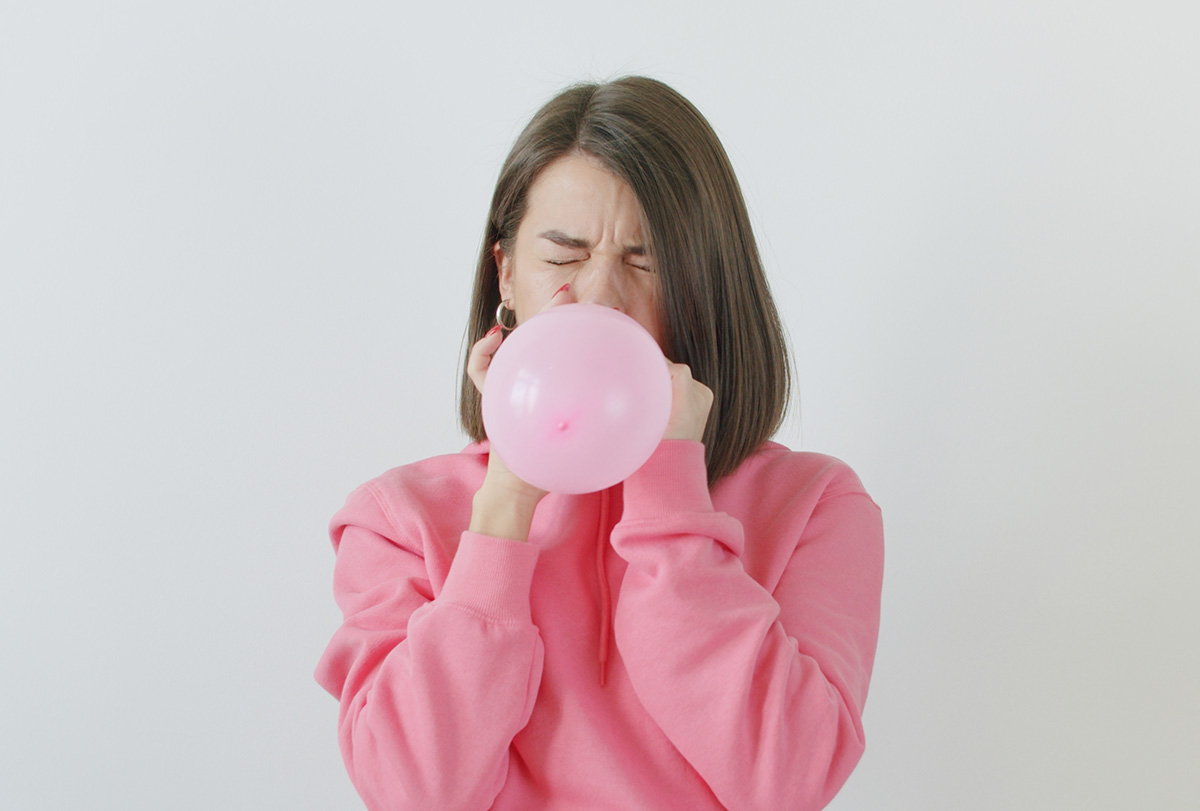
Not only this, flying on an airplane, going scuba diving, or any kind of altitude change can cause a pressure difference in your ears.
When the pressure in both ears is not equal, you may even experience a kind of pain or discomfort in your ears temporarily. This clogging of the ears can also make it hard to hear. (1) So, you may need to learn how to pop your ears.
This article will present some ways of doing it.
Ways to Pop Your Ears
Here are some easy-to-do methods to help pop your ears.
1. Swallow
When you act like you are swallowing something, your eustachian tube opens up, which is a structure in the ears for middle ear protection and pressure stabilization. The tube is the connection between the ear and the respiratory tract.
The opening of the eustachian tube causes the discomfort to disappear and you can feel your ears pop.
If you cannot do the swallowing action, try chewing a piece of gum or sucking on some candy. You can also swallow some water or any other fluid.
Pinching your nose close while swallowing is more effective while popping the ears. (2)
2. Yawn
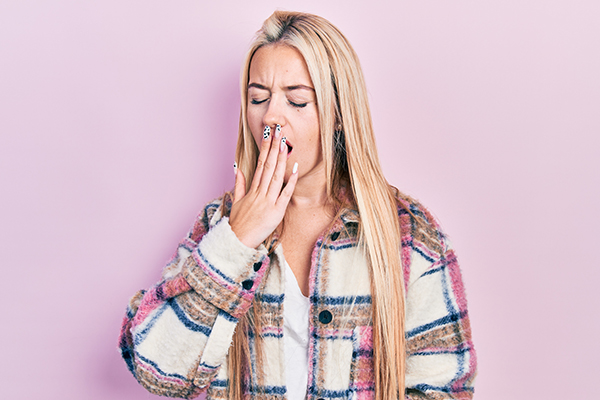
When you open your mouth to yawn, you open a passage for air to enter your mouth. In simple terms, you’re swallowing some air. This will also cause your eustachian tube to open up while stabilizing the pressure in your ears.
If you don’t feel like yawning, you can always fake your way to popping your ears. It might take quite a few tries at yawning till your ears finally pop. (3)
3. Close your nose
It has been observed that blowing out some air after pinching your nose close may help with popping the ears. Lightly blowing out air after inhaling and closing your nostril is a good way of doing it.
When you blow with your nose closed, you apply pressure on your ears that leads to the opening of the eustachian tube. But remember, do not apply too much pressure or sneeze this way as it may harm your eardrums due to excessive pressure buildup. (4)
4. Blow a balloon
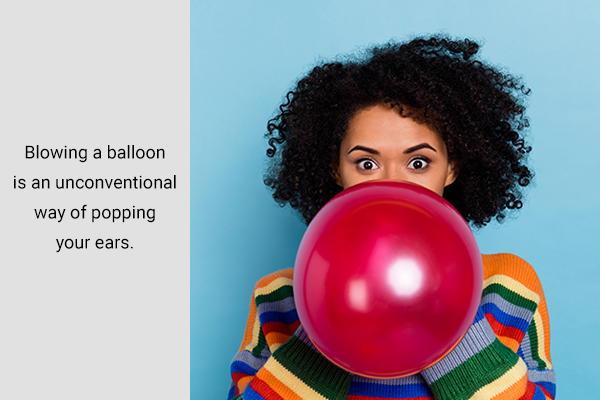
Blowing a balloon is an unconventional way of popping your ears. When your blow a balloon, you apply some pressure to expand the balloon; this pressure may lead to the opening of the eustachian tube.
If you have a constant problem of clogging of ears or a feeling of fullness in them, you may want to keep some balloons handy whenever you need them. Special kinds of balloons are also available specifically for ear popping. (4)
5. Apply a warm compress
Heat therapy is another way of popping your ears. You can keep a warm cloth or a heating pad near your ears to pop them. This will also reduce inflammation in case your ears feel clogged because of an infection or earache. (5)
6. Use decongestants
Your ears feeling clogged up and full can also be linked to a clogged respiratory tract or congestion in the nose. So, using a nasal decongestant to relax your airway can be helpful in popping the ears.
However, avoid using too much decongestant as it is not good for you if used daily or very frequently. (6)
7. Perform the Valsalva maneuver
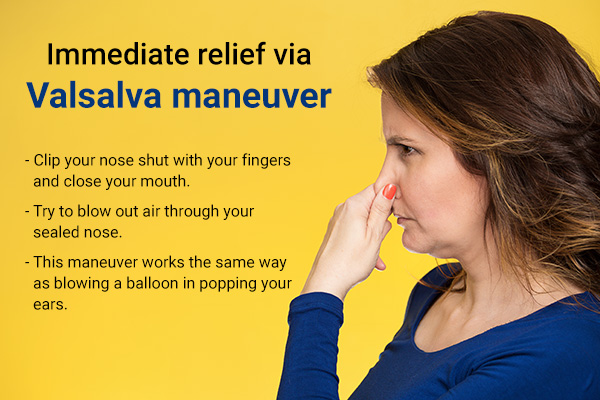
The Valsalva maneuver is a forced expiratory action against a sealed airway, which has a broad spectrum of applications in various medical domains and can be useful for easing discomfort from the feeling of blocked ears. (7)
Here’s how to do it:
- Hold your nose to seal it and close your mouth.
- Blow out air through your nose.
This maneuver mimics various actions such as blowing a balloon. It can be a beneficial remedy, but it should always be performed with instructions from a professional, especially for patients with hypertension.
Additional Tips to Follow When Popping Your Ears
- Use a nasal spray if you need to pop your ears due to sinus blockage and inflammation, which can also clog your ears.
- If you suffer from an infection, get it treated as infected fluid ends up trapped behind your eardrum, causing a plugged-up feeling that can’t be treated by ear popping.
- Decongestant tablets and sprays are useful too, as mentioned above. However, they should not be an option for people with heart issues, high blood pressure, irregular heart rhythms, thyroid disease, or excessive nervousness. If you suffer from any of these, talk with your doctor before using these medicines. Pregnant women should also consult their physicians. (8)
- Further treatment relies upon different factors. For example, acute otitis media or a buildup of earwax will require an ear examination with an otoscope to check for any redness and swelling.
- Experts say that if your ears frequently feel like they require to be popped, you might have an underlying health illness called eustachian tube dysfunction. (8)
General tips that can help prevent this condition:
- Stay away from environmental irritants including pollution, secondhand smoke, and allergens as they can exacerbate your condition.
- Never clean your ears with cotton swabs because earwax may be pushed further into your ear canal.
- Diseases such as the flu and common cold often induce eustachian tube dysfunction. So, protect yourself from infections by washing your hands repeatedly and maintaining a distance from those who might be ill.
- Care for your immune system through a healthy diet and stress management.
- Quit smoking.
What Happens When You Pop Your Ears?
The eustachian tube is a connecting tube between the nose and the middle ear. It supplies the ear with air and also stabilizes pressure on both sides of your eardrum. When a pressure difference develops, your eardrum may experience some bulging.
This pressure difference later goes on to make you feel like your ears are clogged, full, or in discomfort. When you pop your ear, you open up the eustachian tube to balance the pressure on both sides of the eardrum. This relieves any kind of discomfort and is known as the popping of the ears. (9)
Is Popping the Ears Safe?
Popping your ears is usually considered safe. It only takes moving some facial muscles by swallowing or yawning.
No matter what way you go to pop your ears, just remember not to put too much pressure or be too harsh. If your symptoms keep getting worse and your ears don’t pop, then you may need medical assistance. (10)
When to See a Doctor
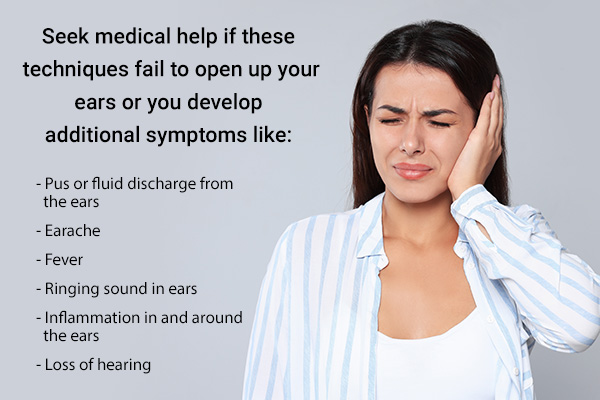
Clogged-up ears can pop on their own or with little effort and the techniques mentioned above. However, it becomes important to seek help if your ears don’t pop or you have accompanying symptoms such as: (11)
- Pus coming from the ears
- Earache
- Fever
- Discharge from the ears
- Ringing sound in the ears
- Inflammation
- Loss of hearing
Final Word
When traveling to a higher altitude or suffering from an allergic reaction, you’re likely to have clogged ears.
These aren’t usually a problem and resolve pretty quickly by themselves, but if clogged ears persist or are accompanied by many other symptoms it can be indicative of a more serious issue. In such cases, seek medical help.
- Was this article helpful?
- YES, THANKS!NOT REALLY


